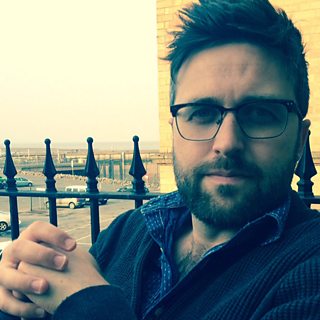Here at we’re a small team of six people, making a total of 35 productions this year. is our main customer, but we also make content for , and .
We make big series – from the conspiracy thriller ‘’, to the comedy drama ‘’; we make single dramas – from a nightmare future in which the UK has fragmented in ‘’, to ‘’, a love story about two people who meet on a train; we make adaptations, from Roald Dahl’s ‘’, to Kafka’s Metamorphosis (for R4’s season later this year); and we work with many new writers. This year we’re developing plays from new-to-radio-writers , , and .
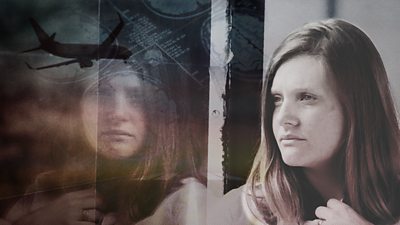
Developing new writers is crucial to the health of our department, as well as the industry in general. Radio is unique in its ability to allow new writers to develop a distinctive voice, and broadcast to a sizeable audience – each gets about a million listeners.
To give an idea of the process involved here’s an account of a new writer project that went out earlier this year - by .
Daf James is a brilliant Cardiff-based writer/composer/performer. I first came across him in the guise of ‘’, Daf’s anarchically hilarious, and mildly terrifying, comedy creation, which he co-wrote with . Daf took the show ‘’ to the Edinburgh festival a few years back, where it won a Total Theatre Award for Music and Theatre.
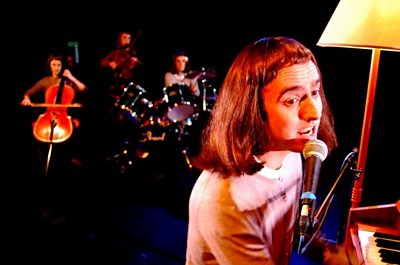
When I started talking to Daf about ideas for Radio 4, he and his partner were beginning to think about adopting. Gay adoption seemed to be an interesting topic to explore, so we put together a pitch for a story about a fictional gay couple going through the adoption process. Radio 4 were interested in the idea, but made the infinitely wise point that if Daf was going through the process for real, why not make the play a more truthful expression of his experience? Daf took this on board and determined to write an intimately honest account of the highs and lows of adoption.
Then just as he was beginning to write, in January 2015, Daf’s mum died.
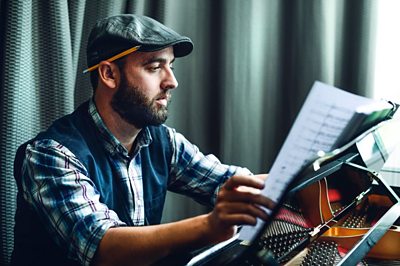
By some dark twist of fate my own mum had died just two months earlier, so our script meetings became these sort of mutual explorations of grief. What fascinated us both was the concept of motherhood – what it means to be a mum and what we both felt we had lost. We shared memories from childhood, tales of our mums’ last days and revelations about how the image of the mother runs through society.
Daf’s adoption experience now took on a different significance: the idea of instigating a family of two dads, a family missing the traditional gender-based ‘mother’ figure, was thrown into focus. And so the plan for the radio play evolved – the context of Daf’s loss gave his gay adoption story an angle: What does it mean to be a mum?
At the same time, at his family home in Cowbridge, Daf had unearthed an old box of cassette tapes from his childhood. While he and his sister were growing up his mum and dad had kept a meticulous record of them on audio cassette.
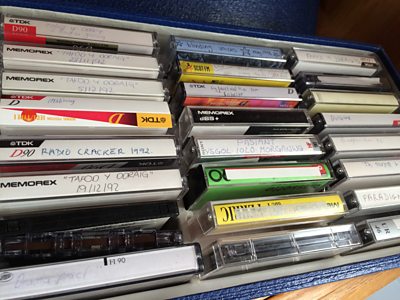
Daf started to write and as the drafts progressed it became clear we had quite an unorthodox radio play on our hands. Part confessional monologue, part docu-drama, part musical.
As with most of Daf’s work, music played a key role. The tapes featured Daf as a child singing a variety of songs, mainly in Welsh. So we recorded Daf listening to himself on tape, and then translating/performing the songs while sat at a piano. These present-day versions of the songs from his past would provide the play with its score. The song that ultimately became the theme of the play was one that Daf would sing each day at nursery school that ended with the lines ‘And say hello to Mami.’
With so much focus on Daf and his mum, we felt it only right that we should interview Daf’s dad to get his perspective on what it means to be a parent too.
The whole piece became a journey of discovery for Daf – a journey through grief and towards fatherhood. The thread that tied it all together was that his mother, though tone deaf, had taught Daf to sing. As Daf says to his own children at the end of the play:
“I'm under no illusion that this will be easy; but I will do everything I can to try and give you what my mother gave me. I will hold the microphone to you when you wish to sing, whatever the melody…”
But one thing was clearly missing – the voice of Daf’s mum. The only recording he had of her was this silly Songify clip he had on his phone. Songify is an app that turns speech into song, and it had amused Daf at the time that he should use it on his mum, as she was tone deaf. And now this was the only audio record he had left of her. He played it to me and tears ran down my cheeks. I’m not sure if they were tears of sadness or of laughter, but it was clear we had our ending.
The process was by no means typical of how we usually work and the result was like no radio play I’d worked on before. But that’s the beauty of working with new writers – it’s about helping them to tell the story they want to tell and encouraging them to tell it in their own unique voice. And hopefully new voices will mean that the sound of radio drama keeps evolving.
